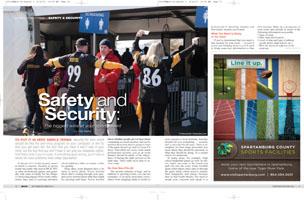
To put it in very simple terms, security for your event should be like the anti-virus program on your computer, or the flu shot you get each fall: the fact that you have it won't stay in your mind, but the fact that you don't have it can give you sleepless nights. And that's only if you're lucky. If something goes wrong, you'll have a whole lot more problems than sleep deprivation.
|
Wisconsinart - Dreamstime.com |
In the pre-9/11 world, security wasn't as much a concern. Security at sports events was really only seen at MLB, NFL or other professional games, and generally only came in handy for two things: (1) protecting players from overly enthusiastic fans, and (2) ejecting attendees who'd imbibed a little too much, a little too quickly.
These days, event planners have a lot more to worry about. You're worried about who's coming through your gate, and you're worried about what they might be carrying with them. You're worried about whether people are (or have been) consuming too much alcohol, and you're worried about how they're going to react if the game doesn't go well (or even if it does). And while not every event needs professional security, you as an event planner should be aware of the importance of having the right services at the right time. That's what we're here to review today.
No one-size-fits-all
The security industry is huge, and in addition to sporting events, you can see examples of security personnel everywhere from shopping malls to hotels to rock concerts to local festivals. And that should tell you something -- security isn't a one-size-fits-all issue. There is no template for how many personnel you need, where they should be stationed, or what they should be doing. To a certain extent, it's situational.
In many areas, for example, high school basketball games go well. In others, fights can erupt in the stands and spill out onto the court. Some football game ticket-takers wave fans in through the gates while others need to inspect their knapsacks and purses because they've had bomb threats. You need to weigh your concerns and speak to a professional to determine whether, and how much, security you'll need.
What you need to bring to the table
If you've determined that you want to hire security for your event -- or even if you're just thinking about it, you'll need to bring some key information to that first meeting. Make up a prospectus on your event, and include as much of the following information as possible:
· Type of event
· Date, time and location
· Level of play and type of athletes (youth sports, high school, etc.)
· Who the decision-maker(s) at the event are
· Number of athletes you're expecting
· Number of team personnel you're expecting
· Number of spectators you're expecting
· Demographics (age, gender, socioeconomic level, etc.) for all the above groups
· How everyone will be arriving (cars, buses, mass transit, etc.)
· Whether this is an event where alcohol will be served, whether people can bring their own beverages, or whether alcohol is not allowed at all.
· Whether you anticipate any tailgating prior to or after the event
· Whether there has been any trouble in the past (this might include fights, arguments, arrests, etc.) Note: Be honest about this, as it can help your security company to be prepared for anything that might arise
· Whether admission will be charged for the event, and whether people will try to get in without paying
· Any specific concerns you may have about the event
|
Jan Kranendonk - Dreamstime.com |
What you want from your security company
Look for a company that specializes in events. We like to say our security guards are in the guest services business because in a sense, they are -- they wind up having to answer questions, give directions and so on, in addition to doing their regular job of maintaining law and order. There are many aspects to event management, and a security company that understands this can help supply the right personnel for your event. Security personnel are often the first to hear about things like medical emergencies or children who have wandered away from their parents, so they'll have to do on-site problem-solving.
Remember that you'll also need crowd management. It isn't enough for an individual to wear a uniform that indicates they're the go-to in case a spectator gets a little too rowdy. Think, for example, about what would happen if a fire alarm went off. You'd want personnel who could evacuate the facility in an orderly and safe fashion.
Find out if the company's personnel receive training. There's a big difference between someone who moonlights as a guard to supplement their income, and someone who knows the ins and out of the profession. A company that keeps its employees updated, trained and educated is going to supply personnel that is better equipped to handle whatever might come up. Note that requirements for this type of training and/or licensing will vary from state to state.
Ask about professional affiliations. Find out if the company has membership in any professional or trade associations. Such groups often offer education and training programs, as well as newsletters and other information, and allow company owners and employees to stay current on developments in their profession.
What about background checks? Do not overlook this essential point. Any company engaged in the business of providing security services should be doing criminal background checks on all its employees. A legitimate company will not hire individuals with a history of felony convictions, weapons violations, assault charges, arrests for controlled substances, and so forth.
Ask about insurance. Insurance and bond requirements will vary from state to state. Some require a minimum $25,000 surety bond in addition to an insurance policy with limits for liability injury that can range up to $1 million. In addition, bonds for property damage are required; those generally are a minimum of $25,000. Many companies will be insured for higher amounts; ask questions and find out what you will be responsible for as well. Remember that larger venues may require higher amounts of insurance.
Get references. A good event security company will have return business from satisfied clients. Find out who those people are and talk to them. There's no substitute for the assurance of a colleague.
Type of guard: We've talked about the fact that guards can perform crowd management functions and guest services functions. But there are also guards who act as escorts to VIPs (and who, as a result, have a higher-risk job and a correlating higher salary). If there are VIPs at your event, find out what they will require in terms of security. You may also want to consider off-duty police officers who supplement their regular pay by doing specialized security work. These individuals, while highly effective, also come at a higher cost. And that, of course, brings us to....
|
Totalpics - Dreamstime.com |
Rates and pricing: Everyone's least favorite subject: the bottom line. We all want to be safe (and we definitely want our kids to be safe), but everyone also wants to stay in the black. What we in the security industry are seeing as a result of the recession is the unfortunate trend of cutting corners. Just remember this: if you're zeroing in on the security company that will charge you the least, you're getting a guard that is being paid a very low wage. How invested are they in their job? How much training do you think they have? And most importantly, how well do you think they're going to perform in the event of an emergency? You can't put a price on personal safety, and if something goes wrong and your cut-rate guard is ineffective at maintaining order, you won't be celebrating the fact that you pinched pennies.
Your event is important and happy athletes are great, but personal safety is absolutely priceless. Plan well, do your research, and you'll have biggest win possible -- a completely uneventful game.




